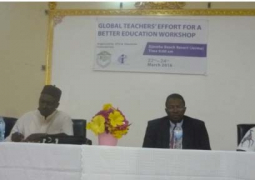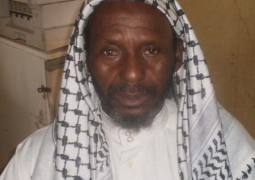Held at NaNA conference hall on 28 and 29 December 2012, the activity is in line with the programme objectives of UNAIDS, NGBV as well as the National Strategic Framework 2009-2014 for HIV & AIDS.
According to officials of NGBV, the objective was to sensitize to build capacity of NGBV focal person on gender, human rights and HIV/AIDS with the theme: “Gender Based Violence Intersection with HIV/AIDS.”
UNAIDS country officer for Banjul Nuha Ceesay said a number of studies and research findings have established the increased vulnerability of women to HIV compared to their male counterpart.
To him, an early estimation by Anderson et al: shows that men run 11% risk of transmission from sexual intercourse with an infected partner, whereas the chances of being infected during intercourse is 20% for a woman. The likelihood of infection increases and antigen concentration rises.
“This event is a demonstration of the strides we have taken as a nation to bring HIV and the vulnerability of women and girls atthe forefront of our national response.”
The event, he noted, is also important because it clearly manifests their willingness to move from commitment to action in the implementation of the Agenda for Accelerated Country Action for Women. Girls, gender equality and HIV programme was launched in The Gambia in December.
Mr Ceesay expressed delight that the event is one of many events that UNAIDS have supported and assured the network of UNAIDS continual support in the upcoming events.
According to Ceesay, research findings in many parts of the world have confirmed that human trafficking in women is widespread and increasing.
In The Gambia, he went on, more that 90 percent of People Living with HIV who are attending HIV treatment services and joined support groups are women and girls.
It is therefore, an understatement to say that women and girls are the hardest hit by HIV and AIDS in many parts of the world including The Gambia.
The challenges, he said, are very huge now than ever before because of the global financial, fuel and food crises.
“Equally putting a strain on our efforts are other competing priorities such as climate change resulting in natural disasters which, he said has further stretched the limited financial resources and development assistance,” said Ousman Badjie, director of NAS.
To him, even whennatural disasters strives women and children continue to bear the brunt of these natural calamities adding that women and children are the hardest hit, yet our response to their plight is often erratic with very little involvement of women during the design stage of all response.
He reiterated that AIDS response can and should serve as a catalyst that brings about socio-cultural, political and legal transformations to promote, protect and fulfill the rights of women and girls, he concluded.
Deputy Director under the Department of Social Welfare, Fallu Sowe, who gave background information of NGBV, further stated thatgender-based violence is a violation of human rights, adding that it includes any act or threat that inflicts physical, sexual, or psychological harm on a person mostly a woman or a girl because of her gender.
He stated that survivors of gender-based violence are mostly traumatized and suffer multiple negative effects from the violence, adding that victims of gender-based violence are often vulnerable women and girls.
“Violence increases the risk of HIV infection in women as a result of physiological and psychological reasons.”
Women, he said, are more vulnerable to infection, and forced sex further increases the risk of HIV transmission to women due to tears and lacerations, especially in adolescent girls.
However, even the threat of violence can have serious negative consequences as women fearing violence are less able to protect themselves from infection.
In addition, the unequal power dimension is distorted further by large age differences in relationships.
It is common for women in The Gambia to marry at a young age or have older intimate partners who are sexually more experienced and are also more likely to have been exposed to HIV/AIDS.
Thus, they are more likely to infect their younger female partners, especially where women cannot negotiate for safe sex because of unequal power in the relationship.
Mr Sowe recommended that for the forum, men and women should be gathered in the same hall to discuss and analyze how certain factors based on gender and age in the community make them vulnerable to HIV.



